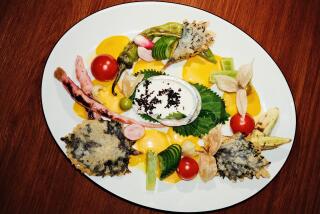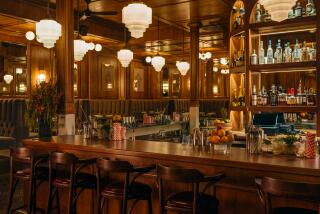A double shot of L.A. life
Imagine sitting in a couple of coffeehouses a day, each for a couple of hours, and calling it work. Imagine eavesdropping a bit on the people around you, or maybe entering into a conversation about whatever comes up, and considering that, too, part of your academic study. Imagine drinking a lot of double espressos on a very regular basis for the sake of research. Such has been the life of French sociologist-psychologist Monique Eleb every time she’s visited Los Angeles over the past 14 years.
Eleb is a psychology professor at L’Ecole de l’architecture in Paris. She is also an observer of human behavior in cities, including Paris, where she lives, as well as her native Casablanca, Morocco, on which she recently co-wrote a book with her husband, architectural historian Jean-Louis Cohen. Her focus is how private life intersects with public life in the modern world, and her pursuit of that topic has frequently brought her to the Getty Center’s research library. In 1989, during one long stint there, she found herself thinking about how different L.A. is from other places she has studied.
“I began to analyze the public spaces all over -- from Santa Monica to Watts, everywhere -- and I wrote down my thoughts in a cafe. Then I began to write about the cafe itself, in the cafe. Sociologists know that cafes are the resonance of life in a city,” she says. “You see everything -- rituals, values, interactions -- and I began to make chronicles of what I see, what attracts people to a particular cafe.”
She is not as interested in Starbucks or the other chains popping up, she says, as in places with individual character.
On a weekday morning this spring, she was continuing her research and downing her second double espresso at Abbot’s Habit, a low-key, hippie-style corner hangout on Abbot Kinney Boulevard in Venice. This was her first visit, and she was a bit of a stand-out in the dressed-down, beachy atmosphere, wearing a white leather blazer and black pants, her elegant demeanor very Continental, though no one seemed to take much notice. It’s the kind of place where some people stay for hours, and others come and go quickly. People at one table marked by lively conversation rotated in and out. Other tables were taken by solitary readers or pairs of friends.
Eleb’s research has led her to about 3,000 L.A. restaurants, watering holes and coffeehouses, she says, where she’s spent a few hours on each visit, sometimes returning many times to the same place, sometimes stopping in just once. In the process she’s abandoned the myth of L.A. glamour and has narrowed her focus to chronicling about 50 venues of varying sorts, from ethnic hangouts to neighborhood joints, stylish spots and overlooked haunts. Her yet-to-be-titled book on L.A. cafe life will be published next year by Editions de L’Imprimeur, an art, architecture and literary publisher based in Paris. Her research may not reveal much that’s new to the regulars of these venues, but to the French audience at which it’s targeted, it will reveal the humanity of a complex region.
“L.A. is not just freeways,” Eleb says, citing perhaps the only cliche about this city that equals that of Hollywood glitz. And the “cafe,” by which she means any place where people go to socialize even more than to eat and drink, is a perfect place to observe people defining themselves. “It is a place where you work on your identity. It is a place where you work on what you want to be.”
*
A reflection of the neighborhood
The diversity of L.A., of course, has provided a diversity of material. Some cafes, such as Espresso Mi Cultura, a combination coffeehouse, art gallery and bookstore on Hollywood Boulevard, attract a largely Latino crowd interested in preserving their cultural identity. At Home, on Hillhurst Avenue in Los Feliz, the weekend crowd is young professionals with babies. Although people might believe they’re just out for a meal, Eleb posits that the choice of where to go is actually a matter of “identity politics.”
For example, she says, “Los Angeles has a problem recognizing its intellectual identity, so people go to cafes to show that they write, that they read.” By contrast, she cites a restaurant that she loves, a gathering place for new arrivals from Mexico where there’s music playing and tables set with guacamole and ketchup, a place she calls “incredibly nostalgic and sad.”
Not long ago, she took a research trip to Skybar, the ultra-hip nightclub atop the Mondrian in West Hollywood. “It was very difficult to get in,” she says. “A Russian scholar at the Getty proposed it, and he called ahead three times before they said yes.” She and a small group of friends arrived, only to be examined at the door by a “beautiful girl” bouncer, who promptly rejected them. “She said she didn’t know about our appointment and went to the office to see if it was true. Once we were in, we could see why. We are old people,” says Eleb, who is 57. “It was a meat market for young actors, and we were really weird in this setting.” They ordered drinks, stayed about a half-hour, and left. “We couldn’t stand it,” she says with a laugh.
She doesn’t know whether she’ll write about Abbot’s Habit in the book, but she remarks that it has a familiar feeling, of a friendly, neighborhood type of place. “The fact that I’m French means that nothing is banal to me,” she says, observing the art on the walls, the fellow sitting nearby rolling his own cigarettes and that virtually everyone who works there is wearing a hat -- either a woolen cap or a baseball cap. “In Paris,” she says, “it’s difficult for me to see. I can’t write about my cafes. I use the distance here for observation.”
Nevertheless, her next book will be on Parisian cafe life, and the research she has done on L.A. will help her to redefine her notion of the familiar. She’ll also have a lot more material to digest there, she believes. At the Jardin de Luxembourg, 11 cafes are lined up, one right next to the other, catering to everyone from the “cyber chic to the immigrant population.”
Her work, she insists, won’t help anyone who wants a guidebook, since many of the places she’s studied will have closed by the time her books come out. Nor will it be purely academic, although she thinks the book on Paris may be more so than the one on L.A. No tips on where to get the best java, or the best mozzarella sandwich.
But if you want to know about the typology and phenomenology of a place that offers coffee, tea and camaraderie, Monique Eleb is the one to ask.


